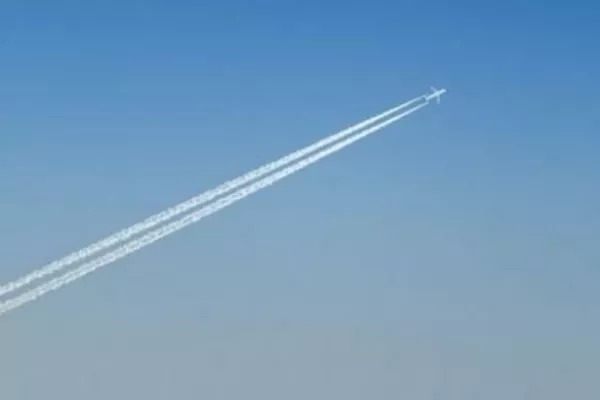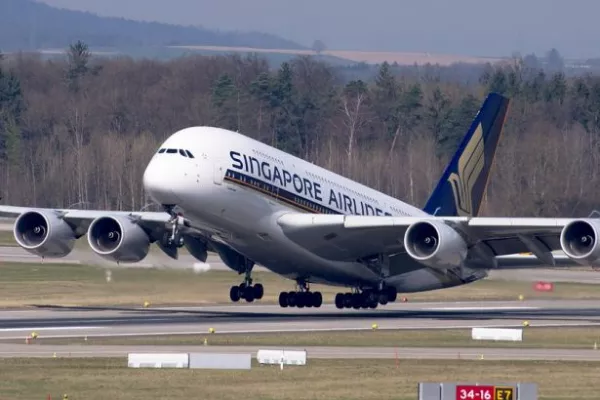Hospitality Ireland presents a round-up of global travel, airline and aviation news.
International Travel Searches Spike After U.S. Moves To Ease Curbs
Travel website Kayak said on Monday October 18 that searches related to international travel to the United States spiked 48% on Saturday October 16, from the same day one week earlier.
Kayak is owned and operated by Booking Holdings Inc .
Separately, Expedia said on Monday that there was a 28% increase in UK travelers and a 24% increase in French travelers searching for hotels in the United States, comparing Oct. 8-10 to Oct. 15-17.
Delta Air Lines Chief Executive Ed Bastian said last week before the White House's statement that the airline had seen "improving trends internationally, spurred by the decision to lift" the restrictions, announced in September.
"Thanks to this important policy change, many families are going to be reunited this holiday season for the first time in almost two years," Bastian said.
The Centers for Disease Control and Prevention (CDC) said late Friday that foreign nationals who had received mixed doses of vaccines would be eligible to travel to the United States, but additional questions remain to be answered, including the government's policies on exemptions, including for children.
Challenges Abound As Tata Draws Up A Flight Plan For Air India
Tata Sons' $2.4 billion purchase of debt-ridden, government-owned Air India will give the conglomerate immediate access to valuable flying rights and landing slots that will help it claw back market share from foreign rivals.
But industry executives warn any success will be a long and complicated process that could cost it more than $1 billion and require fixing myriad problems, including its worn-out fleet, poor service and the lack of a charismatic leader.
Air India, with its maharajah mascot, was once renowned for its lavishly decorated planes and stellar service championed by the airline's founder, JRD Tata, India's first commercial pilot.
But since the mid-2000s, its reputation has fallen as financial troubles mounted. It flew widebody planes with business class seats in poor repair and grounded some of its new Boeing Co 787 Dreamliners to use for spare parts. Customers faced many delays and staff and suppliers were not always paid on time, executives said.
"If you don't have newer airplanes or airplanes that are reliable, no matter what you do, you are going to have a problem," said a veteran aviation industry executive who was not authorised to speak publicly about the matter.
The ownership transfer from the government to Tata is expected to go through by the end of the year. The company will then have until summer 2022, when a post-COVID demand surge is expected, to fix the issues, the person added, estimating it would cost more than $1 billion to refurbish Air India's 141 planes and up to $300 million to retrain staff and improve operations and service.
The figures do not include the purchase or lease of new aircraft.
Tata and Air India declined to comment.
Air India's biggest competitive advantage is its ability to fly non-stop to destinations like the United States and Europe, where it enjoys lucrative landing rights. Foreign hub carriers such as Emirates and Etihad Airways can only compete with one-stop options.
Many industry experts predict that after the pandemic, non-stop flights will become even more popular, particularly with lucrative business travellers.
"I'm a big believer if a passenger has a choice their strong preference is to fly point to point," Robert Martin, chief executive of lessor BOC Aviation said at a CAPA Centre for Aviation event last week.
Foreign carriers dominated international traffic to and from India before the pandemic hit, with Air India holding a 19.3% share, including its low-cost arm Air India Express, in the final quarter of 2019, according to government statistics.
If an improved Air India can win back even 20% from other global carriers it would be a big boost to the bottom line, the industry executive said.
Air India also needs a charismatic and experienced leader along the lines of JRD Tata or Richard Branson to help rebuild a service culture at the airline, experts said.
Tata's experience of building India's largest hospitality chain, with Taj hotels as the flag-bearer, could help with the staff and service, said Dilip Cherian, an image consultant. The company also owns the luxury car brand Jaguar as well as information technology firms, steel concerns and other businesses.
"The hospitality businesses will help them hugely in setting the image right. The Taj fits in very well with the kind of Air India culture of early years," Cherian said.
Tata also owns majority stakes in Vistara, a premium joint venture with Singapore Airlines and AirAsia India, a low-cost carrier with AirAsia Group. Tata has benefited from its partners' expertise but neither venture is profitable.
Having three airlines is likely to put Tata in a strong bargaining position with aircraft manufacturers, engine makers and lessors, as well as with suppliers, airport operators and fuel companies, analysts say.
Air India had approximately $2.1 billion of unpaid bills, which the government took over before the airline's sale to Tata.
The carrier enjoys goodwill in the international market because of its legacy, said Anuj Trivedi, partner at law firm Link Legal, which assisted Air India on the deal.
"It won't be easy and there will be challenges, but with Tata the hope is Air India will take off again," he said.
UK Regulator Caps Heathrow Fee-Raising Plan But Airlines Still Furious
The UK aviation regulator said Britain's biggest airport Heathrow will not be permitted to raise passenger charges by as much as it had wanted, but airlines opposed the scale of the hike as the hub and carriers battle to recover pandemic-linked losses.
COVID-19 has restricted flying for more than 18 months, placing huge financial strains on Heathrow and airlines like its biggest user, British Airways, and putting airport charges at the centre of a bitter row.
Airlines on Tuesday October 19 criticised the UK's Civil Aviation Authority's (CAA) initial proposals for Heathrow to be allowed to charge as much as 50% more per passenger over the 2022-2027 period.
Heathrow had wanted to almost double charges at the top end of its request.
Airlines UK, the country's industry body, said it would oppose the CAA's proposals "in the strongest terms".
"It’s Heathrow’s shareholders and not our customers who should be asked to foot the bill," the group said in a statement.
Heathrow wants to be able to charge more to help recover pandemic losses of $4 billion, but airlines, who have also lost billions, don't want to have to raise ticket prices to cover higher airport charges just as they are trying to stimulate demand.
British Airways, owned by IAG, and UK-based competitor Virgin Atlantic, say that Heathrow is already the most expensive airport in the world and that they would oppose the proposals in the coming consultations with the regulator.
"The disproportionate increase compared to other European hubs will undermine its (Heathrow's) competitiveness even further and UK consumers will be losing out," IAG boss Luis Gallego said.
The CAA said its proposals, which will be finalised next year, struck the right balance between protecting consumers and allowing the airport to continue to invest.
Heathrow is owned by investors including Spain's Ferrovial , the Qatar Investment Authority and China Investment Corp.
Responding to the proposals, Heathrow said that the regulator should safeguard a "fair return" for its investors.
"The settlement is not designed to shield airlines from legitimate cost increases or the impacts of fewer people travelling," an airport spokesman said.
Under the CAA proposals, Heathrow could raise its per passenger charge to between £24.50 and £34.40 ($33.76-$47.41). Heathrow had requested that the cap be set at £32 to £43. In 2020, the charge was £22.
There would be no additional adjustment to Heathrow's regulatory asset base, something which Heathrow had requested, said the CAA, outlining plans for introducing a new risk sharing mechanism to prevent either the airport or the consumer bearing all the risk of future uncertainty.
Israeli Startup AIR Unveils Flying Vehicle To Be Used "Like Cars"
Israeli startup AIR on Tuesday October 19 unveiled its first "easy-to-operate" electric, vertical takeoff and landing (eVTOL) aircraft that it aims to sell directly to consumers predominantly in the United States starting in 2024.
AIR has been working with the U.S. Federal Aviation Authority (FAA) for two years and expects to obtain certification by the end of 2023 for the AIR ONE, a two-seater, 970 kg (2,138 lb) eVTOL, which will have a flight range of 110 miles (177 km), Chief Executive Rani Plaut told Reuters.
AIR raised seed funding of under $10 million last year and has been running unmanned tests of its vehicle. It is building prototype models and expects to sell its eVTOLs for around the same price as an expensive car, Plaut said, without providing more precise details.
An increasing number of investors and aviation companies have piled into the hot but yet-to-be-approved urban air mobility space and the number of eVTOL startups has proliferated.
Air taxi firm Joby Aviation has gone public via a merger with a blank-check company and Vertical Aerospace - which has pre-orders for up to 1,000 eVTOL aircraft with launch customers Avolon and American Airlines - is going public via a merger with Broadstone Acquisition Corp.
Plaut said the difference with AIR is that it will be sold to consumers who can use its "fly by intent" software to fly without being fully trained pilots.
"Our focus is entirely personal," he said. "We're not talking about commercial flights, we're talking about people using this as they use cars."
The United States has a lot of open airspace that makes it a suitable first market for the AIR ONE. Plaut said AIR expects demand could reach 15,000 vehicles a year.
AIR is currently raising additional funds to get through the FAA certification process, but did not disclose how much.
Southwest Airlines Tells Employees Unvaccinated Can Continue Working
Southwest Airlines has told its employees that it would allow the unvaccinated to continue working, rather than being placed on unpaid leave, if their exemption requests have not been evaluated by the Dec. 8 deadline.
United Airlines Posts Smaller Loss, Sees Recovery From Pandemic Gaining Traction
United Airlines Holdings on Tuesday October 19 reported a smaller quarterly loss than a year ago, but a resurgence in coronavirus cases slowed bookings and drove up cancellations, upending the carrier's plan to return to profit.
Chief Executive Scott Kirby, however, said recent headwinds the airline has faced are "turning to tailwinds."
United said it expects revenue in the current quarter to recover to up to 75% of 2019 levels, improving from about 68% in the quarter through September.
The company's shares rose approximately 2% to $47.22 in extended trading on Tuesday October 19.
Buoyed by a strong summer travel season, United was expecting to be profitable in the third and fourth quarters. It lowered its estimates last month, citing the impact of the fast spreading Delta variant of the coronavirus on travel.
With COVID-19 cases still high but in decline in the United States as more people get vaccinated, airlines said bookings have bottomed out.
Rival Delta Air Lines last week said domestic consumer travel has returned to pre-pandemic levels.
U.S. carriers are eyeing a strong holiday season, with United planning to fly its biggest domestic schedule since the start of the pandemic, offering more than 3,500 daily domestic flights in December - representing 91% of its domestic capacity compared to 2019.
They are also optimistic about the re-opening next month of the transatlantic route - the most lucrative long-haul market - which they expect will spur a recovery in international traffic.
Betting on pent-up travel demand, the Chicago-based carrier last week announced an expansion of its transatlantic service next year, and Kirby has said he expects the route to have the busiest summer ever in 2022.
The company reported an adjusted loss for the third quarter of $1.02 per share, compared with a loss of $8.16 per share last year at the height of the coronavirus pandemic. Analysts were forecasting a loss of $1.67 per share, according to Refinitiv data.
With government pandemic aid, the airline reported a net profit of $1.44 per share for the quarter.
United will discuss the results on a call with analysts and investors on Wednesday October 20 morning.
Singapore Welcomes More Travellers Under Quarantine-Free Programme
Singapore welcomed on Wednesday October 20 the first travellers under an expanded quarantine-free programme, marking a big step towards the aviation hub restoring its international links, despite a sharp rise in its COVID-19 cases.
Singapore Airlines flights from Amsterdam and London arrived on Wednesday under the so-called vaccinated travel lanes (VTL).
"Yeah, that's (a) perfect visit. It's really convenient," said Singapore resident Andrea Mullens, who returned from the Netherlands with her daughter, who will return to school in Singapore.
"It's a good thing happening. I think travel in general is a bit challenging at the moment."
Husband Harald said he would return to the Netherlands next week on business.
"I do appreciate that family can travel again," he said.
From this week, the lanes will be extended to vaccinated arrivals from Canada, Denmark, France, Italy, the Netherlands, Spain, Britain and the United States, who can enter Singapore without quarantine if they pass COVID-19 tests.
Singapore earlier opened the lane to arrivals from Germany and Brunei and will include South Korea from mid-November.
While Singapore is opening further, a recent rise in cases has prompted tighter measures locally, including limiting social gatherings to two people and only allowing vaccinated people to enter malls.
Mask-wearing is also mandatory, with some violators fined or even jailed for breaching COVID-19 regulations.
On Monday October 18, the United States advised citizens against travel to Singapore, raising its alert for the city-state to its highest risk level.
Singapore saw a record 3,994 new coronavirus cases on Tuesday October 19, having recorded more than 3,000 daily infections in recent days. Most are asymptomatic or mild, with over 80% of the 5.45 million population vaccinated.
Singapore had, until recently, kept the virus largely under control through border closures and strict contact-tracing and quarantining.
News by Reuters, edited by Hospitality Ireland. Click subscribe to sign up for the Hospitality Ireland print edition.








